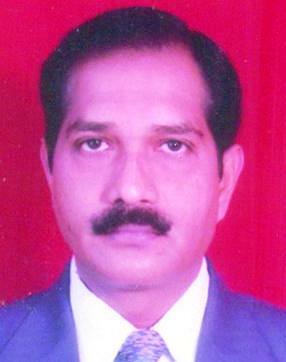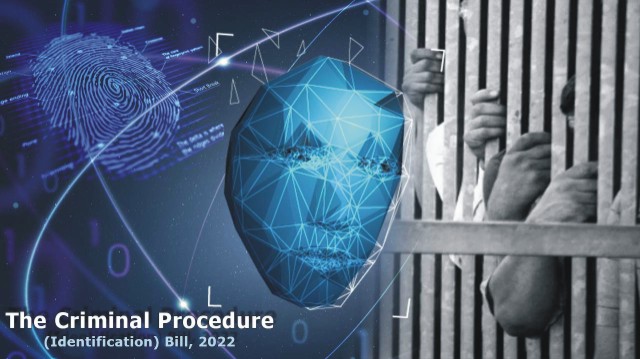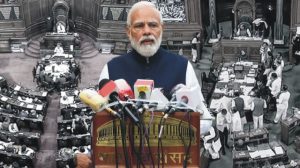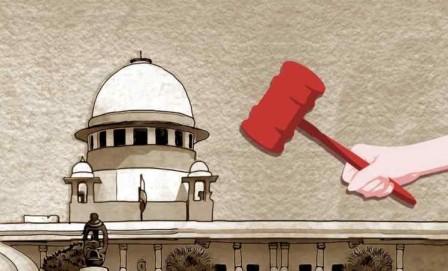

The Criminal Procedure (Identification) Bill, 2022 passed by The Rajya Sabha and the Lok Sabha has stirred debate on its use and misuse. Some experts have welcomed it with some riders, while others believe that it will pave the way for a police state.
The other concern is if the government wants to misuse any law, it will do so, no matter how good or bad a law is. It is therefore the need of the hour that other stakeholders like judiciary should remain pro-active and civil society more vigilant.

The Criminal Procedure (Identification) Bill, 2022, is aimed to modernise a British-era law by allowing police to collect samples of a person’s biometric details, such as fingerprints and iris scans, if they have been arrested, detained, or placed under preventive detention on charges that carry a seven-year or longer sentence.
“The Act does not provide for taking these body measurements as many of the techniques and technologies had not been developed at that point in time. It is, therefore, essential to make provisions for modern techniques to capture and record appropriate body measurements in place of existing limited measurements,” the Bill reads.

As per the Bill, The National Crime Records Bureau (NCRB) will collect the biometric data from state governments, Union Territory administration, law enforcement agencies and preserve the record for 75 years. It will also have the power to destroy these records. The NCRB will process these records and share the details with any law enforcement agencies.
Vibhuti Narain Rai, Ex- Director General of Police, Uttar Pradesh while sharing his perspective on the ongoing debate said, “This law was already in existence since 1920. Our technology and our scientific knowledge were limited then. Norms of collection of Finger and footprints was there, but there was no internet. As a police officer, when I was posted in Banaras at that time getting access of footprints from any other place (police station) was not very easy. But with the advent of internet, access of finger prints has become very easy. Now a police station in Karnataka can get finger-prints from Ballia easily and quickly at the click of a mouse.”

“I fail to understand why parliamentarians are opposing it and I found nobody raising convincing arguments against it. If I am not a criminal or economic offender then why should I be scared about the biometric data? All the MPs visit Dubai and they travel to Europe and America. When I visited Dubai for the first time long back, I was surprised; they were taking prints of my eyes. It was not done in India at that point of time. Now we are doing in India for Aadhaar. If you apply for a visa in United States one will have to go with all these formalities. People are ready to give more information to Jio but hesitant to give less information as compared to Jio to the government,” the Ex-DGP said.
“I personally feel that mostly the economic offenders are scared of it. I can also give example from Bureaucracy. All corrupt bureaucrats, they may be having crores of money but they cannot buy property because now Aadhaar card is required. With this, the government can know the number of properties one will buy or have. It is also true that one can have five to six cars but only one car in his name, the rest may be in others name like wife, gardener, driver and so on. Now it cannot be done because a cook or a gardener will have to explain how he can afford to buy a luxury car. I also know that a man was drawing salary from five medical colleges and he was not attending even a single medical college. When Aadhaar was introduced he was removed from all these faculties,” he argued.
On the question of safeguard and misuse, the retired IPS office said, “If government wants, it can misuse no matter how good or bad a law is. One can see what is happening in Uttar Pradesh. More than 100 people have been shot even when they were still suspects and not declared criminals by courts. Any law could be misused. The point is, there should be pro-active judiciary, vigilant civil society, public opinion, and media. They will have to fight. The BJP government is more likely to have these tendencies because of their ideological moorings, training and upbringings.

Another senior IPS officer, Dr. Hanif Qureshi who is a TEDx speaker and an Indian Police Service officer, also served as secretary to the government of Haryana with vast experience of policing comprising criminal investigations said, “I think it is the need of the hour but there should be enough safeguards to ensure that it is not misused.”

However, former DGP Chhattisgarh MW Ansari said that it will pave the way for a police state if it does not have any mechanism to see how it is implemented, used and misused.
John Dayal, noted social and human rights activist while talking in detail about all the nuances of the Identification law argued, “Why prisoners? That term can include everybody who has been inside a prison while not on official duty as a police officer, jailor, staffer, doctor or magistrate. This term includes people arrested for protesting a price rise, for demanding their due wages as an employee, or a university student taking part in a political agitation. It can mean undertrials awaiting a court hearing or sentencing. It also means people who have not been even charged with a crime, but are just held on suspicion as hundreds of young and old people arrested under UAPA or by the National Investigations Agency,”

While expressing his concern, Dayal said, “All these people have not had a court of law and a judge find them guilty. Most perhaps will not be guilty. India has nothing to be proud of the number of people who spend long years in jail and then have a judge find them innocent of the crime for which they had been jailed, perhaps under political pressure or because the police were acting under influence or were corrupt. I am not very sure if they will be finger printed in the police station when they are arrested or only after they have been convicted and sentenced.”
On biometric data, he said, “The second is the issue of biometrics itself. Most Indians give their biometric data to the government in the belief that Aadhaar cards are mandatory. The government had said they were not mandatory. The Supreme Court also said that. But slowly, step by step, the government sabotaged the Supreme Court ruling by making the Aadhar card and its data mandatorily linked to PAN cards, bank accounts, income tax, GST and so on. Now often, schools demand this for processing scholarships. Aadhaar data has become universally mandatory without legal or parliament sanction.”
 On the protection of data and its misuse, he opined, “There have been deep concerns about how data is shared, sold or consumerised by the corporate sector or used for surveillance by government agencies. The right to privacy of a citizen upheld by the Supreme Court as a fundamental right has been short circuited. Internationally, biometric data is sought for serial sexual offenders. In the west, electronic leg or ankle cuffs or shackles have been used to ensure that a suspect does not move out of a court’s jurisdiction, for instance.”
On the protection of data and its misuse, he opined, “There have been deep concerns about how data is shared, sold or consumerised by the corporate sector or used for surveillance by government agencies. The right to privacy of a citizen upheld by the Supreme Court as a fundamental right has been short circuited. Internationally, biometric data is sought for serial sexual offenders. In the west, electronic leg or ankle cuffs or shackles have been used to ensure that a suspect does not move out of a court’s jurisdiction, for instance.”
“India does not have the scientific forensic expertise required to solve intricate cases. This is borne out by the low rate of conviction, and the massive use of third degree to pin or fix blame. This may I fear, become another instrument put to use in extra judicial manner to curtail the freedom of people. Even criminals have human rights. Ownership of their biometric data was one of these,” he said.

While sharing his point of view, Nasir Aziz, president of SAMLA (South Asian Minorities Lawyers Association), said, “In my opinion this is an attack on personal liberty. The bill is loosely drafted. While for hardened criminals, the government may have some justification but using it even for people arrested while protesting, the amendment crosses all limits.”
Earlier when it was debated in Parliament, Kunwar Danish Ali, Member of Parliament (Lok Sabha), member Committee on Defence, Estimates and Home had tweeted, “Criminal Procedure Identification Bill will surely lead us to a Police state. Raising voice against human rights violations will be a crime in ‘New India’. With the misuse of UAPA, peaceful and innocent anti CAA protesters are still languishing in jails.”

Mahua Moitra, a Trinamool Congress (TMC) MP, said in her Lok Sabha statement that the new Bill is more intrusive and has fewer checks and balances than the one being abolished. The new Bill was introduced without the country having any overbroad data protection legislation in place. A Personal Data Protection Bill was submitted in 2019; however it was referred to a Joint Parliamentary Committee and has not been drafted yet.
She added, “The new Bill aimed to keep pace with technological advancements over the last ten years, but these advancements also expand the state’s surveillance powers, and if there are no adequate safeguards, the new Bill will most likely provide the government with inordinately broad discretionary powers.”
“The Bill would pave the path for India to become a surveillance state,” said Congress MP Manish Tewari, who spearheaded the opposition attack. The Bill violates Articles 14, 19, 21, and 20(3) of the Constitution.” ![]()
Also Read:
Centre’s Opaque Auction Rules For Pulses Rip Off Govt Coffers, Help Millers Strike Rich
Need to amend laws like UAPA to provide for punishment for those who slap false cases
Global Arms Trade: Who are the real winners?
Why not 40 pc tickets for women in Punjab and elsewhere?
Punjab – How a deadly cocktail of Agri-Water-Energy nexus going to destroy it?
North Pole and the ideological conflict of RSS & Hindutva
Politics of Symbolism: Dalit Chief Ministers in India

Disclaimer : PunjabTodayTV.com and other platforms of the Punjab Today group strive to include views and opinions from across the entire spectrum, but by no means do we agree with everything we publish. Our efforts and editorial choices consistently underscore our authors’ right to the freedom of speech. However, it should be clear to all readers that individual authors are responsible for the information, ideas or opinions in their articles, and very often, these do not reflect the views of PunjabTodayTV.com or other platforms of the group. Punjab Today does not assume any responsibility or liability for the views of authors whose work appears here.
Punjab Today believes in serious, engaging, narrative journalism at a time when mainstream media houses seem to have given up on long-form writing and news television has blurred or altogether erased the lines between news and slapstick entertainment. We at Punjab Today believe that readers such as yourself appreciate cerebral journalism, and would like you to hold us against the best international industry standards. Brickbats are welcome even more than bouquets, though an occasional pat on the back is always encouraging. Good journalism can be a lifeline in these uncertain times worldwide. You can support us in myriad ways. To begin with, by spreading word about us and forwarding this reportage. Stay engaged.
— Team PT


Copyright © Punjab Today TV : All right Reserve 2016 - 2024 |